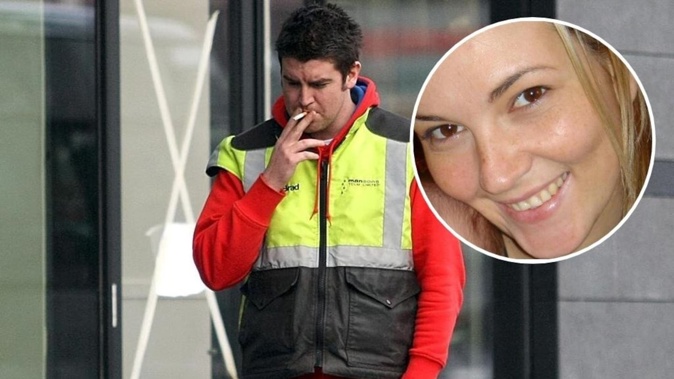
The civil engineer who murdered and dismembered his former partner, put her remains in a wheelie bin and buried them in the Waitakere Ranges has been granted parole, the Herald can reveal.
Bradford James Joseph Callaghan appeared before the parole board on June 9 for the second time, and is to be released in early July.
In 2012, Callaghan, then 33, was sentenced to life imprisonment with a minimum non-parole period of 13 years and eight months for the 2010 murder of Carmen Thomas, as well as attempting to pervert the course of justice by dismembering and burying her body, and trying to making it appear she was still alive.
 Moments before Brad Callaghan brutally attacked Carmen Thomas with a baseball bat he was told he was not the father of his son. Photo / Greg Bowker
Moments before Brad Callaghan brutally attacked Carmen Thomas with a baseball bat he was told he was not the father of his son. Photo / Greg Bowker
At his first parole board hearing in 2024, Callaghan said he had apologised to the Thomas family and claimed he wished he had been caught straight away.
That board denied Callaghan parole, saying it was concerned about the considered and methodical approach he had shown to covering his tracks after the murder.
Thomas was a mother-of-one and part-time sex worker, and was reported missing by Callaghan in mid-2010.
He told police she had failed to pick up their son as arranged. Police launched an investigation, and three months later Callaghan was arrested.
 Carmen Thomas's body was dismembered, put in containers filled with concrete then dumped in the Waitakere ranges. Photo / Supplied.
Carmen Thomas's body was dismembered, put in containers filled with concrete then dumped in the Waitakere ranges. Photo / Supplied.
Moments before Callaghan attacked Thomas with a baseball bat, she had told him he was not the father of their son.
He then killed her with blows to the head, dismembered her body and put it in containers filled with concrete. He said he had intended to dump the bins at sea but the plan involving a friend’s boat ‘fell apart’ and he instead buried them in West Auckland.
Last year the Herald was granted permission to attend his first parole board hearing, where Callaghan said “I killed Carmen because I reacted to something she told me, that I should never have reacted to. In a state of rage, I snapped, like a volcano of emotions. I hit her eight times in the head”.
 Police and forensics staff worked at the home of Carmen Thomas after she was beaten to death by her former partner, Brad Callaghan. Photo / Janna Dixon
Police and forensics staff worked at the home of Carmen Thomas after she was beaten to death by her former partner, Brad Callaghan. Photo / Janna Dixon
According to the latest decision of the parole board, Callaghan has since completed a Medium Intensity Rehabilitation Programme, holds a minimum-security classification and had received a positive report from his supervising officer.
He has completed a safety plan and undertaken four guided releases, including one to his proposed release address.
The board questioned Mr Callaghan about his actions after the murder and said he was able to share the background to his thinking at the time of the murder, and explained the changes he had made during his rehabilitation, and what he had learnt about himself.
 Police investigating the murder of Carmen Thomas in Auckland. Brad Callaghan (bottom inset) has served his time for her murder. Photos / NZPA, Supplied
Police investigating the murder of Carmen Thomas in Auckland. Brad Callaghan (bottom inset) has served his time for her murder. Photos / NZPA, Supplied
He told the parole board he had become much more open with his family.
“The circumstances of Mr Callaghan’s offending and in particular his actions after he had killed his partner remain of concern to the Board” the decision said.
“He has however completed all appropriate treatment...We have reached the view that he is no longer an undue risk to the safety of others and can be managed on parole. Once we reach that position, we are obliged to direct his release from prison,” it said.
 The Parole Board reached the decision that Brad Callaghan is no longer an undue risk to the safety of others. Photo / NZ Herald
The Parole Board reached the decision that Brad Callaghan is no longer an undue risk to the safety of others. Photo / NZ Herald
“He is required to attend a monitoring hearing in December and will require a report from his Probation Officer as to his compliance with release conditions and his progress on parole. Electronic monitoring would not appear to be available, and in his case it is not required,” the decision said.
The parole board outlined his release conditions which included: living at an agreed address in Northland, complying with any psychological treatment recommended by a probation officer, and not contacting his victim’s family without the prior written approval of a probation officer.
He is also not to start a new job or change jobs without probation officer approval, and must disclose details of any intimate relationship that commences, resumes or terminates.
Carolyne Meng-Yee is an Auckland-based investigative journalist who won Best Documentary at the Voyager Media Awards. She was recently runner-up for Best Editorial Campaign and part of a team that won Best Coverage of a Major News Event: Philip Polkinghorne Murder Trial. She worked for the Herald on Sunday from 2007-2011 and rejoined the Herald in 2016 after working as an award-winning current affairs producer at TVNZ’s 60 Minutes, 20/20 and Sunday.
Take your Radio, Podcasts and Music with you









